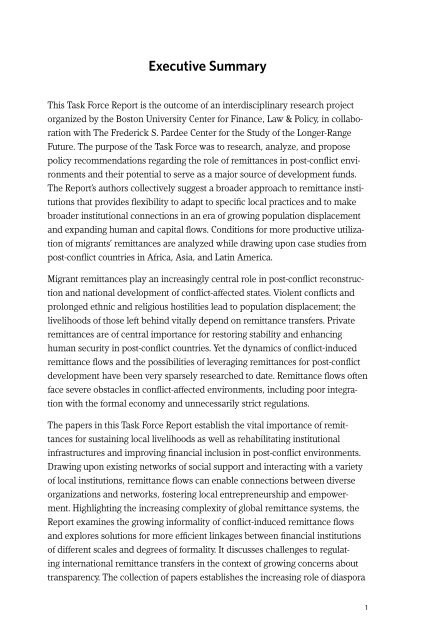Pardee-CFLP-Remittances-TF-Report
Pardee-CFLP-Remittances-TF-Report
Pardee-CFLP-Remittances-TF-Report
You also want an ePaper? Increase the reach of your titles
YUMPU automatically turns print PDFs into web optimized ePapers that Google loves.
Executive SummaryThis Task Force <strong>Report</strong> is the outcome of an interdisciplinary research projectorganized by the Boston University Center for Finance, Law & Policy, in collaborationwith The Frederick S. <strong>Pardee</strong> Center for the Study of the Longer-RangeFuture. The purpose of the Task Force was to research, analyze, and proposepolicy recommendations regarding the role of remittances in post-conflict environmentsand their potential to serve as a major source of development funds.The <strong>Report</strong>’s authors collectively suggest a broader approach to remittance institutionsthat provides flexibility to adapt to specific local practices and to makebroader institutional connections in an era of growing population displacementand expanding human and capital flows. Conditions for more productive utilizationof migrants’ remittances are analyzed while drawing upon case studies frompost-conflict countries in Africa, Asia, and Latin America.Migrant remittances play an increasingly central role in post-conflict reconstructionand national development of conflict-affected states. Violent conflicts andprolonged ethnic and religious hostilities lead to population displacement; thelivelihoods of those left behind vitally depend on remittance transfers. Privateremittances are of central importance for restoring stability and enhancinghuman security in post-conflict countries. Yet the dynamics of conflict-inducedremittance flows and the possibilities of leveraging remittances for post-conflictdevelopment have been very sparsely researched to date. Remittance flows oftenface severe obstacles in conflict-affected environments, including poor integrationwith the formal economy and unnecessarily strict regulations.The papers in this Task Force <strong>Report</strong> establish the vital importance of remittancesfor sustaining local livelihoods as well as rehabilitating institutionalinfrastructures and improving financial inclusion in post-conflict environments.Drawing upon existing networks of social support and interacting with a varietyof local institutions, remittance flows can enable connections between diverseorganizations and networks, fostering local entrepreneurship and empowerment.Highlighting the increasing complexity of global remittance systems, the<strong>Report</strong> examines the growing informality of conflict-induced remittance flowsand explores solutions for more efficient linkages between financial institutionsof different scales and degrees of formality. It discusses challenges to regulatinginternational remittance transfers in the context of growing concerns abouttransparency. The collection of papers establishes the increasing role of diaspora1


